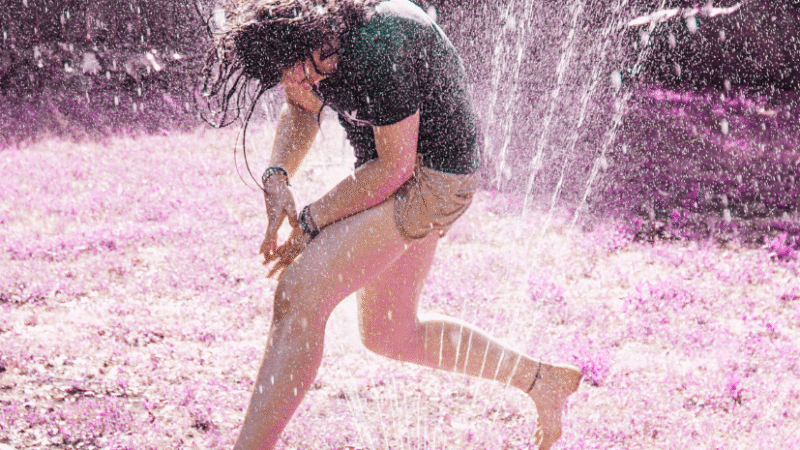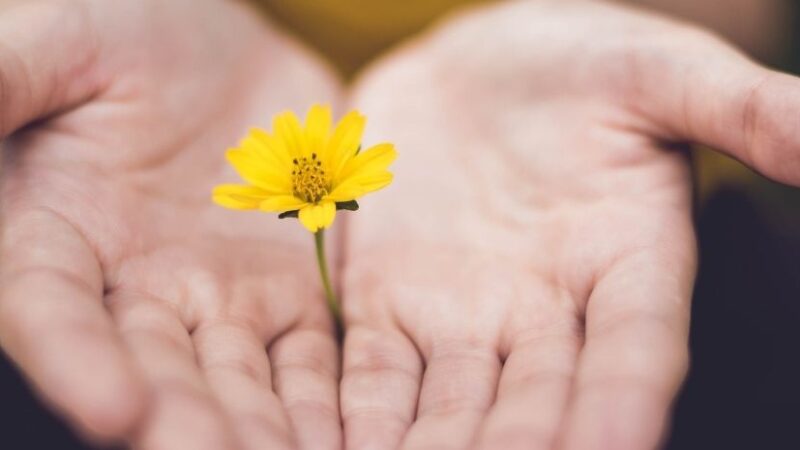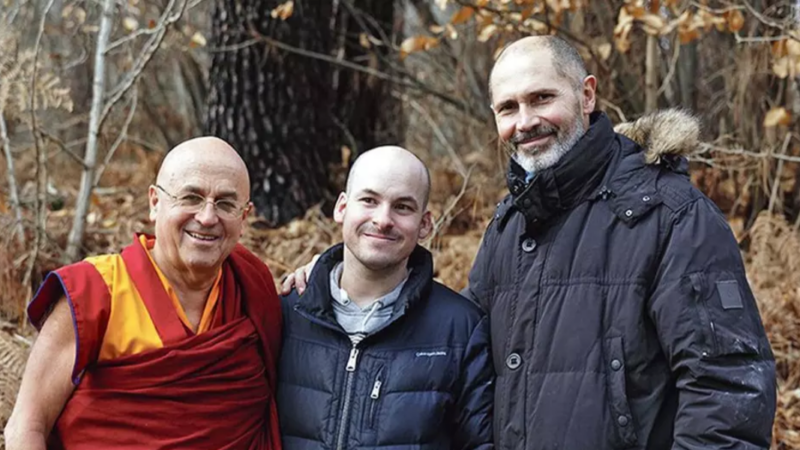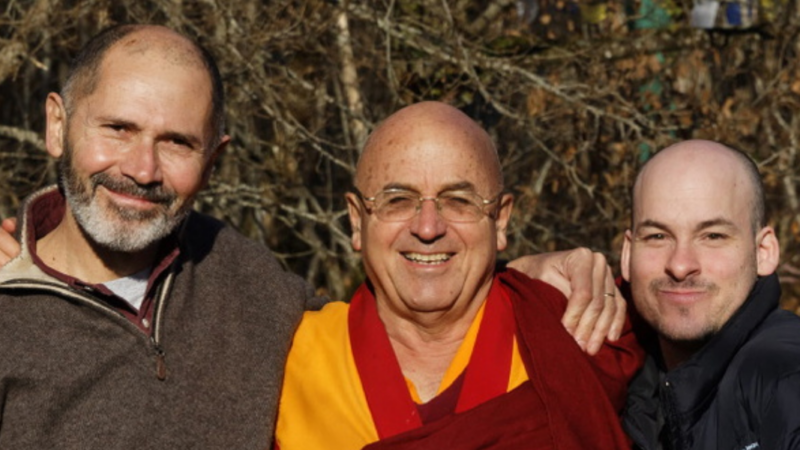Take Your Inner Child on Playdates
Have you ever been ice-skating before? It sounds like a fun winter activity (especially if you enjoy the cold, like I do), but it can be frustrating and even downright scary if you’re new to it.
Picture this: I took my nephew ice-skating for the first time, full of excitement to see him experience some joy. At twelve years of age, he was already taller than me and had size thirteen feet thanks to his six-foot-eight-inch-tall dad (my brother). The biggest rental skates they had came with worn-out laces rather than the secure plastic bindings all of the other skates had. I could see that they were a little loose around the ankle, but we tied them as best we could and hit the ice.
If you’ve ever seen a newborn deer figuring out how to walk for the first time, you can picture my nephew’s first time on ice skates. His ankles kept knocking in, and he was reaching to hold onto anything for dear life as he wobbled around the perimeter of the rink. It was difficult to watch, not because it was embarrassing, but because I know how hard he is on himself when he’s not immediately good at new things. I wanted to see him having fun, and instead I saw him frustrated and discouraged as all he could do was attempt to remain vertical.
I figured it couldn’t get worse, so I suggested that we trade in his skates for a smaller pair with the more secure plastic buckles to see if that made any difference. He went along with it, probably just to humor me, and we stuffed his feet into some size twelves and made sure his ankle support was good as could be. When I tell you it was a night and day difference, I’m not exaggerating. Suddenly he was speeding around the ice like a pro, lapping past me and his sisters with the biggest smile on his face. He circled the rink over and over again; as his confidence grew, so did his joy, and he even began to try tricks and spins. All he had needed was one little adjustment to his foundation, and he suddenly felt safe enough to have fun.
Here’s the thing: most of us go around in our lives on rickety old skates with worn-out laces. When your only focus is doing your best to remain upright, there’s not much room for joy or play. The big shame in that is that play often is the medicine we most need.
In my experience, the crux of inner child work is reconnecting to the part of you who knows how to play. Sometimes you may first need to make some adjustments that allow you to feel safe enough to play, like practicing nervous system regulation and self-soothing. Once you’ve done that, though, your goal is to invite in as much play as possible. And not adult versions of play that are really just a facade for dissociative behaviors, but real, childlike wonder.
Invite in curiosity and awe and silliness and uninhibited joy. Start by returning to the things you loved to do when you were a kid. Maybe that means setting aside time each weekend for arts and crafts. Maybe it means participating in physical activities that feel like play, such as dancing, swimming, sports, or jumping on a trampoline. Maybe it just means giving yourself permission to skip while you walk or sing while you drive.
The point is, when you bring those younger versions of you into your present-day life, you not only have more fun, but you also experience more healing. We were never meant to lose touch with our inner child. Yes, it’s important to learn how to be self-sufficient and responsible, and aging is inevitable. But it’s equally important not to take yourself too seriously along the way.
Try This
Your homework is to set regular playdates with your inner child. Do things that sound like fun, even if they don’t make logical sense. Allow yourself to be as carefree and openhearted as possible, without judging the things that bring you joy. The sillier it feels, the more on point you likely are. Here are some examples to consider:
- Take an afternoon off of work and go to an amusement park.
- Schedule an evening of watching your favorite childhood movies.
- Spend the weekend out in nature, frolicking with your imagination.
- Try something brand new, like rock climbing or ice-skating, to tap into that feeling of beginner’s mind.
Play is an important part of our overall well-being. Consistently making time to get into that creative flow state will help you deepen your relationship with your inner child . . . and your adult self. I suggest checking in at least once per month, if not weekly, to see where you can fit more play into your life.
Excerpted from Choose Your Self: How to Embrace Being Single, Heal Core Wounds, and Build a Life You Love.
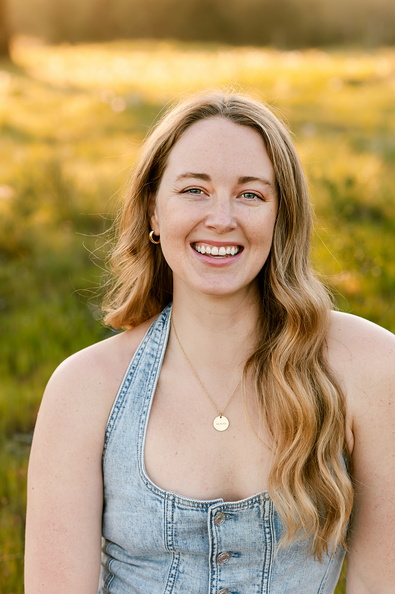
Megan Sherer
Megan Sherer is a certified somatic therapist and licensed hypnotherapist whose mission is to help others build healthy and fulfilling relationships, starting with self. She hosts the Well, Then podcast and founded the women’s therapy app The Self Care Space. For more, visit megansherer.com.
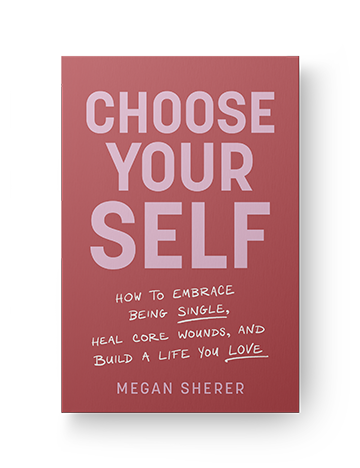
Choose Your Self
Learn More
Amazon | Barnes & Noble | Bookshop | Sounds True
3 Ways to be in Financial Integrity this Holiday Season
In the whirlwind of holiday parties, gift-giving, and cooking, you can lose your grip on financial integrity faster than slipping on ice. But, your integrity is essential to your happiness and your self-worth. Here are a few easy ways to regain your center and empower your choices to give from your heart instead of your wallet.
Treasure Connectivity
When your presence is truly a gift to others, you won’t find yourself needing to overspend. Practice loving presence with the little interactions you have through the day. Slow down. Listen more. Smile more. Appreciate the uniqueness of the person in front of you. When you treasure connectivity, you won’t find yourself spending money on things that aren’t in alignment with your values.
Affirm Your Unique Values & Convictions
Speaking of aligning to your values … what are YOUR values? What do you value about the holidays? About gifting? About receiving? About money? Take a minute and write down your values and your convictions about the holidays. Read your convictions before bed, and upon arising. You’ll be more likely to live up to your convictions with money. And when you don’t, you’ll be very clear exactly what value you violated. When that happens, stop. Notice. Course correct.
Gift from Your Values
Whether you’re baking cookies or filling stockings, make each an act in alignment with your convictions. At first you may be aware of how your extended family or friends have different trends, values, or convictions. That’s ok. Notice. And be YOU. Be in your integrity. Make your people paleo gingersnaps or whatever you find nourishing and delightful. Tell your people why you gift how you gift. They love you for being you. And you being you will help them find their own financial integrity.
 Cate Stillman has been teaching audiences how to create health and wellness through yoga and Ayurveda since 2001. She is the author of Body Thrive, and hosts the Yogahealer Real Thrive Show, a weekly podcast featuring dozens of experts in the field. She splits her time between the Idaho border country and Mexico.
Cate Stillman has been teaching audiences how to create health and wellness through yoga and Ayurveda since 2001. She is the author of Body Thrive, and hosts the Yogahealer Real Thrive Show, a weekly podcast featuring dozens of experts in the field. She splits her time between the Idaho border country and Mexico.
Nancy Windheart: The Guru Cat

Freddie and I would sit for hours and just hang out, often sitting in a beach chair that I set up in my laundry room. I didn’t multitask; I just sat with Freddie.
As we’d sit together each night, Freddie offered me a visceral, embodied experience of dropping deeply into the lake of awareness that was present underneath my constantly running thoughts. Through his example, which included a kind of energetic transmission that I felt with my whole body, I was able to enter into a relaxed and open state of being where there was no me, no cat, no chair. “We” were simply a great pool of vibrant energy, deeply grounded, connected, centered, and resting. Sometimes we’d both sleep, but mostly I’d find myself in a deep place of awareness that had no edges, no boundaries. Often, insight and wisdom would bubble up, and the clutter that was ever present in my mind and life would simply fall away.
Freddie’s telepathic communication with me was clear and precise. If I popped up into thinking, worry, spinning, or obsessive thoughts, he’d wake up, look at me with intense clarity through his torn and scratched eyes, and send me the clear message: “You’ve left. Come back.” And with that guidance, I could. He’d put his head back down and close his eyes, and I’d drop back into presence and awareness. Through his example, I learned that rather than trying to control or remove my frenetic thoughts, I could simply allow them to exist on the surface and drop “beneath” them into an ocean of awareness that was Freddie’s natural state.
I discovered that the essence of this quiet, open, deep space of pure presence that I shared with Freddie was love. It was not the confusing, complicated human version of what we often know as “love,” but a pure, deep, connected flow of energy, devotion, and presence that I could feel with every cell of my body.
With Freddie’s body in my lap, and our shared experience of deep presence and connection, I discovered that love and awareness were not separate things. I was love, he was love, we were love, love was. We floated together in a lake of love. Everything was love—just love.
I didn’t realize at the time that this was what people called “meditation.” I was simply spending time with my cat, my beloved friend, and sharing an experience that helped me to relate to my life and the world in a different way than I’d known. It was years later, when I learned meditation practices from human teachers, that I realized what Freddie had taught me.
Freddie became my wise, loving lap-cat guru, but he always hissed at me. It became our little inside joke. He would hiss at me, and I would hiss back at him, in my best imitation of semi-feral street cat. I would laugh, and he would look satisfied and amused.
Eventually Freddie’s FIV brought his body down, and he died in the year of my fortieth birthday. My heart cracked wide open—and as I grieved the loss of his physical presence in my life, I knew that our relationship was alive and would continue in a new form. I continued to feel the essence of his spirit surrounding me, and I knew that he was not gone but had shifted into a different state of being.
Two years after his passing, Freddie came to me in a vision on New Year’s Day. He communicated to me, “It’s time. This is the year you step onto your path and begin your training as an animal communicator.” I listened to him. I listened to Freddie because I trusted him more than I had trusted anyone in my life. He knew. He knew everything. I began a period of several years of training and apprenticeship, with Freddie’s wisdom, guidance, and clarity supporting me each step of the way.
My life changed profoundly and dramatically from that time on, leading me in directions I never could have imagined. I left my job teaching music, began my journey as a professional animal communicator, and now have a life I could never have imagined all those years ago, teaching an international community of students and professionals a curriculum that has its roots in the teachings I received from Freddie.
I now perceive Freddie as a spirit guide, an energy that is much bigger and vaster than could have been contained in his small cat form. I remain in communication and connection with him daily, and he continues to teach me and guide me. He continually reminds me of the true nature of reality, the web of connection that I perceived in my childhood—the fundamental, universal, creative fire of love. Usually his guidance is gentle, clear, and loving, but when necessary, I hear his unmistakable, kick-in-the-pants hiss.
This is an excerpt from a story written by Nancy Windheart and featured in The Karma of Cats: Spiritual Wisdom from Our Feline Friends, a compilation of original stories by Kelly McGonigal, Alice Walker, Andrew Harvey, and many more!
 Nancy Windheart is an internationally respected animal communicator and interspecies communication teacher. Her work has been featured in television, radio, magazine, and online media, and she has written for many digital and print publications. Nancy’s life’s work is to develop deep harmony and understanding between species and on our planet through interspecies communion, connection, and communication, and to facilitate physical, mental, emotional, and spiritual healing and growth for beings of all species through her services, classes, training programs, and retreats. She lives in Santa Fe, New Mexico, with her animal family of dogs, cats, and chickens. To learn more, visit nancywindheart.com.
Nancy Windheart is an internationally respected animal communicator and interspecies communication teacher. Her work has been featured in television, radio, magazine, and online media, and she has written for many digital and print publications. Nancy’s life’s work is to develop deep harmony and understanding between species and on our planet through interspecies communion, connection, and communication, and to facilitate physical, mental, emotional, and spiritual healing and growth for beings of all species through her services, classes, training programs, and retreats. She lives in Santa Fe, New Mexico, with her animal family of dogs, cats, and chickens. To learn more, visit nancywindheart.com.
Read The Karma of Cats today!
Sounds True | Amazon | Barnes&Noble | IndieBound


Meet a Coauthor of . . . Freedom for All of Us
The Author
Matthieu Ricard is a Buddhist monk, humanitarian, and one of three authors of Freedom for All of Us: A Monk, a Philosopher, and a Psychiatrist on Finding Inner Peace, available in November, 2020. He is also the author of several other books, including The Monk and the Philosopher, Happiness, and Altruism. He is a major participant in research collaboration between cognitive scientists and Buddhist practitioners. Ricard is a noted translator and photographer, and has founded humanitarian projects in India, Tibet, and Nepal. For more information, visit karuna-shechen.org.
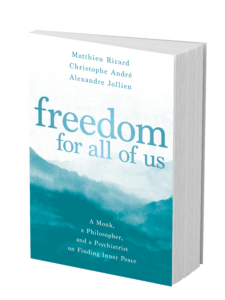
The Book
With their acclaimed book In Search of Wisdom, three gifted friends—a monk, a philosopher, and a psychiatrist—shed light on our universal quest for meaning, purpose, and understanding. Now, in this new in-depth offering, they invite us to tend to the garden of our true nature: freedom.
Filled with unexpected insights and specific strategies, Freedom for All of Us presents an inspiring guide for breaking free of the unconscious walls that confine us.
Send us a photo of your sacred space.
[Pictured here is the] Shechen Monastery in Nepal, where I live a good part of the year:

[And] the views from my hermitage in Nepal:

‘

If you could invite any three transformational leaders or spiritual teachers (throughout time) to dinner, who would they be and why?
I do not have dinner and he does not either, but if I had to choose to spend an hour quietly with someone alive today, it would be His Holiness the Dalai Lama. [He is] someone of boundless compassion and wisdom, who treats every sentient being—from the person who cleans the floor at the hotel when he travels, to a head of state—with the same kindness, respect, and attention.
As for [two people] who [are no longer] in this world, I would give everything to spend another hour in the presence of my two main spiritual teachers: Kangyur Rinpoche and Dilgo Khyentse Rinpoche, who inspire every instant of my life.
Has your book taken on a new meaning in the world’s current circumstances? Is there anything you would have included in your book if you were writing it now?
Many people have indeed faced great hardship; being sick, left alone, and having lost a dear one. But for those who simply had to be with themselves and a few kin, I was quite surprised to see how difficult they found [it] to just be with their own minds for extended periods of time. It seemed that it was such a new situation and they had few tools to deal with it.
As a contemplative, I value tremendously [the] time spent alone in my hermitage in the Himalaya[s], cultivating fundamental human qualities that allow me to slowly become a better human being. I believe that among those qualities, inner freedom and compassion are two key factors and that, therefore, our dialogue [in Freedom for All of Us] is quite timely. Most of the subjects that we reflect upon seem very relevant [during] these troubled times and I hope that they will be useful!

Learn More
Sounds True | Amazon | Barnes & Noble | Bookshop | IndieBound
Meet a Coauthor of . . . Freedom for All of Us
The Author
Christophe André is a psychiatrist specializing in the psychology of emotions. His books include Imperfect, Free, and Happy, and Meditating, Day after Day. He lives in France. For more, visit christopheandre.com.
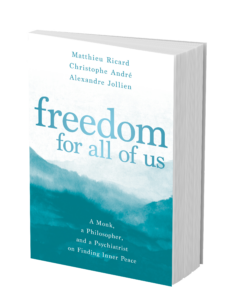
The Book
With their acclaimed book In Search of Wisdom, three gifted friends—a monk, a philosopher, and a psychiatrist—shed light on our universal quest for meaning, purpose, and understanding. Now, in this new in-depth offering, they invite us to tend to the garden of our true nature: freedom.
Filled with unexpected insights and specific strategies, Freedom for All of Us presents an inspiring guide for breaking free of the unconscious walls that confine us.
Translated from the original responses in French.
Send us a photo of your sacred space or workspace.
Here is the view from my home office in Saint-Malo, Brittany, France. My writing space is situated on the top-most floor of the house, just underneath our roof, and each time I lift my head to look out the window, I see the beach, the ocean, and, further away, the ramparts of the old city. The ever-changing nature [of this place], the sky and the tides forever moving (and morphing), the memory of all the corsairs (pirates) of Saint-Malo’s past … all of these things are what inspire me and bring joy to my life.
What is something about you that doesn’t make it into your author bio? It could be something that impacts your work, or something totally random and entertaining!
[There’s] nothing necessarily odd or extraordinary, but perhaps a rather banal fact [is my] being a parent. For me, becoming a father is the event that has most changed me in my life (and has most encouraged me to better myself). It has truly enriched my life the most.
There are two key moments (or memories) that for me [define] being a parent. Firstly, those moments where we realize our children are watching and judging us; and this moment can be very moving and also uncomfortable as a parent, because you feel like your children have discovered all your limits or your faults. (How can we hide it? Impossible, they will see them! At least once, or from time to time.) The essential lesson is that we don’t try to constantly hide our true selves, and this encourages us to transform ourselves. The watchful eye and judgments of our children can feel like a challenge for parents, but a fruitful challenge [nonetheless].
The other key moment is when we realize that our children are more skilled in ways we are not (and sometimes in all ways)! It’s that moment when we discover that we, as parents, are learning from our children; their intelligence, generosity, and enthusiasm. It’s the moment that we allow ourselves, discreetly and with great humility, to let them be our teachers.
If you could invite any three transformational leaders or spiritual teachers (throughout time) to dinner, who would they be and why?
I imagine I would probably be too intimidated to actually have dinner or a conversation with the following three people! I would probably prefer to follow them, like a shadow or a small mouse, and to watch them live and work over several days. To observe their intimate, everyday routines, and listen to their discourse (which in a way is possible with all of their published works). It has always seemed to me that wisdom arises, above all, through example and embodiment.
I would love to follow the everyday life of Etty Hillesum, [the writer], who was a stranger to hatred. Even when she would have every reason to hate the Nazis, who had her executed [at Auschwitz], she still spoke of grace even in a world where only fear, violence, and injustice seemed to live.
I would love to follow alongside Rev. Martin Luther King Jr. during a day in his life. I admire him for his choice to fight for civil rights without the use of violence. I remember, vividly, crying when I visited his memorial in Atlanta.
And finally, I would love to shadow Henry David Thoreau when he was living in his cabin at Walden. I admire his decision to live a life filled with only the essentials: nature, spirituality, and few material possessions, which is in stark contrast to the mistakes and values that we hold in this modern day.

Learn More
Sounds True | Amazon | Barnes & Noble | Bookshop | IndieBound
Brené Brown audio collection from Sounds True
We are excited to be offering a collection of inspiring audio learning programs from our friend Brené Brown, New York Times bestselling author of the acclaimed The Gifts of Imperfection and Daring Greatly.
These three programs have quickly become some of our most talked about and bestselling titles and are available in both CD and downloadable formats. They include:
1. The Power of Vulnerability: Teachings on Authenticity, Connection, and Courage
2. Men, Women, and Worthiness: The Experience of Shame and the Power of Being Enough
3. The Gifts of Imperfect Parenting: Raising Children with Courage, Compassion, and Connection
We hope you enjoy these programs from Brené and that they are helpful and supportive on your inner journey!


